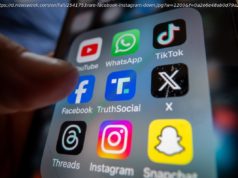Responding to reports that North Korea said it no longer needs nuclear tests, Jim Hanson, president of the generally pro-Trump Security Studies…
Responding to reports that North Korea said it „no longer needs“ nuclear tests, Jim Hanson, president of the generally pro-Trump Security Studies Group, credited President Donald Trump.
„No one was expecting anything to come of Trump’s fiery rhetoric, except people who understand that diplomacy works better with a credible threat of military force backing it up,“ Hanson told Fox and Friends over the weekend. „It’s brought Kim (Jong Un) to the table in ways none of President Trump’s predecessors were able to do.“
Even though the nuclear-test freeze is mostly symbolic, this strikes me as entirely defensible. Trump critics who don’t like his „fiery rhetoric“ and unpredictability, myself included, should concede that it has its benefits on occasion.
I’m not sure it should be chalked up to some grand strategy, though. Trump is fiery and unpredictable all the time. Calling it strategic brilliance only when it works for him is a bit like celebrating the perfect accuracy of a broken clock twice a day.
Still, Hanson’s right. In this case, letting Trump be Trump has yielded real diplomatic results that would likely be hailed as breakthroughs under, say, a President Hillary Clinton.
The problem is that these diplomatic triumphs are almost certainly meaningless or even dangerous — something that many Trump supporters would be saying right now if Hillary Clinton were president.
The crux of the dilemma isn’t Trump. It’s North Korea.
Put simply: North Korea is not a normal country. It’s not even a normal dictatorship. It is essentially a totalitarian monarchy whose dynastic rulers claim divine origins.
But even totalitarian regimes have domestic interests and internal politics they must contend with. The Kim dynasty has sustained itself for three generations by force-feeding its own people, including the elites, a powerfully intoxicating ideological brew.
It holds, among other things, that Koreans are the world’s superior race and that the North is to fulfill its destiny by reuniting the peninsula under Kim’s rule. North Koreans are taught almost from birth that Americans are barbarians.
„U. S. imperialist aggressors,“ Kim said a few years ago, „are cannibals… seeking pleasure in slaughter.“ He was commemorating a largely fictional U. S. atrocity during the Korean War.
Of course, absolute rulers have a lot of latitude to do whatever they see as being in their self-interest, but facts and their own ideologies get in the way.
The leaders of Hamas cannot accept the legitimacy of Israel; the mullahs in Iran cannot embrace secularism; and Kim almost surely cannot decide that North Korea doesn’t need a nuclear arsenal or that he can make real peace with South Korea.
Domestically, accepting the legitimacy of South Korea’s government would be tantamount to delegitimizing North Korea’s government. The Kim regime is similarly convinced, perhaps with reason, that it needs a nuclear deterrent to survive. Agreeing to disarm, in the leaders‘ minds, would be suicidal.
North Korea can be coaxed into some kind of „peace process“ with the South as a way to extract more concessions from the West. But that’s the same game it has played for decades.
The North Korean regime will never get rid of its nuclear deterrent, because its leaders believe they need it and have told their own people they must have it.
Contrary to a lot of the White House talking points, Kim’s trial balloon about „denuclearizing“ doesn’t mean he’s open to disarming. It’s 30-year-old jargon for getting America to abandon the South Koreans, paving the way for unification on the North’s bloody terms.
Trump may think, as a source reportedly told Axios he does: „Just get me in the room with the guy (Kim) and I’ll figure it out.“
If the president does get in a room with Kim Jong Un, I have no doubt he’ll emerge with something he can call a victory. I also have no doubt that it will be very similar to previous American diplomatic victories.
Jonah Goldberg is an editor-at-large of National Review Online and a visiting fellow at the American Enterprise Institute. What’s your view?
Got an opinion about this issue? Send a letter to the editor, and you just might get published.






